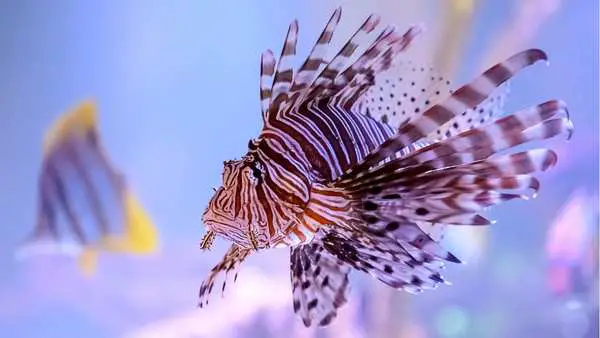Lionfish have always been a hot topic of conversation amongst hobbyists and those interested in marine life. Their appearance is unusual, to say the least, sporting a red, orange, and black coloration with deep stripes covering their body. But perhaps the most unusual and certainly most dangerous aspect of this reef fish is the venomous spines that cover their pelvic, anal, and dorsal fins.

Biologists and experts alike have labeled lionfish as one of the most dangerous fish in the ocean. And, despite there being no recorded deaths from lionfish, anyone looking to keep lionfish as an addition to their home aquarium must be cautious as a sting from their toxic spines could easily cause infection, negative reactions, and intense pain.
This is not to say you shouldn't keep lionfish as they are one of the most interesting and unique fish to observe and keep as a fish community member.
But... you should do so with caution, treating them with the respect they deserve. Fortunately, they are not known for being aggressive toward humans, but they will act in self-defense if they feel threatened, so you need to be extremely careful if you own one.
They are not typically aggressive towards humans, but they sure can be with other saltwater fish. In fact, lionfish are one of the most aggressive saltwater fish you will come across when it comes to other fish, so ensuring the correct setup with compatible tank mates and more is paramount.
Below is a video guide I created for this page for your reference:
Are Lionfish Poisonous?
Lionfish are not poisonous, but they are highly venomous. In fact, lionfish are eaten in many different countries and are considered to be somewhat of a delicacy. Their spines and fins are their only source of venom.
The venom is specifically located at the tip of each spine and at the point of their sharp fins. Lionfish showcase 18 beautiful dorsal fins that are highly venomous, but this is all for their own protection, and they do not intentionally want to cause damage to humans.
When keeping your own lionfish, you will need to avoid touching or even being close to the fins or spines of your lionfish, due to them acting out of defense, they may think you are invading their territory and launch an attack.

This is why it is important to keep your lionfish in a suitably-sized aquarium, giving them plenty of space and room, reducing stress and a potential hospital trip for the owner.
Do Lionfish Bite Humans?
Despite having teeth, lionfish typically use their venomous spines as a defense and attack mechanism rather than their teeth. Fortunately, unless threatened, lionfish are unlikely to sting or bite humans.
Usage of these incredibly dangerous spines is for fending off or letting predators know not to mess with them. There are some ways in which you can ensure you do not get stung by your lionfish in a home aquarium environment, or at least reduce the risk.
Lionfish stings have been proven not deadly, however, for children and older persons with health conditions, they can certainly be fatal. So, ensure that there are always people with you whenever you intend to interact with your lionfish and keep them well away from the reach of children.
Lionfish Sting Symptoms
Despite not being deadly or life-altering for the majority of people, a lionfish sting can and will likely be a painful affair. Typically, after being stung, swelling starts to appear around the sting area, with the addition of bleeding, numbness, and bruising.
Whilst most people will not need to go to the hospital and can recover from the sting without any medical support, it isn't a nice experience, and if you are unlucky or do not remove the sting immediately after being stung, the following symptoms can occur:
- Shortness of breath
- Fainting
- Swelling of the face and throat
- Fever
- Cardiac arrest
- Temporary paralysis
- Nausea
- Headache
- Dizziness
- Convulsions
The venom can spread quickly throughout the bloodstream, which can lead to tissue death and decreased blood flow in the body, which typically happens when people get stung on their fingertips.
How to Treat and Avoid a Lionfish Sting
If you are an experienced fishkeeper, which you should be if you are looking after a lionfish or multiple, you should be aware of the dangers caused by touching them or being touched by them. Remember, lionfish are territorial fish and deserve to be respected, if they feel threatened, they will sting.

When cleaning your lionfish tank or feeding them, or partaking in any situation where you will be able to be stung the most important thing to do is keep your distance from them. Additionally, you need to be slow and careful with your movements, to ensure you do not startle them.
The smaller 'dwarf' subspecies of lionfish will be less likely to sting you as they are smaller and require less space.
If you do get stung, remove the spine immediately. Most stings are mild and therefore will not require medical attention should you remove the sting and clean the area immediately. Purchasing a larger aquarium, where your lionfish has more space will alleviate any risks too.

